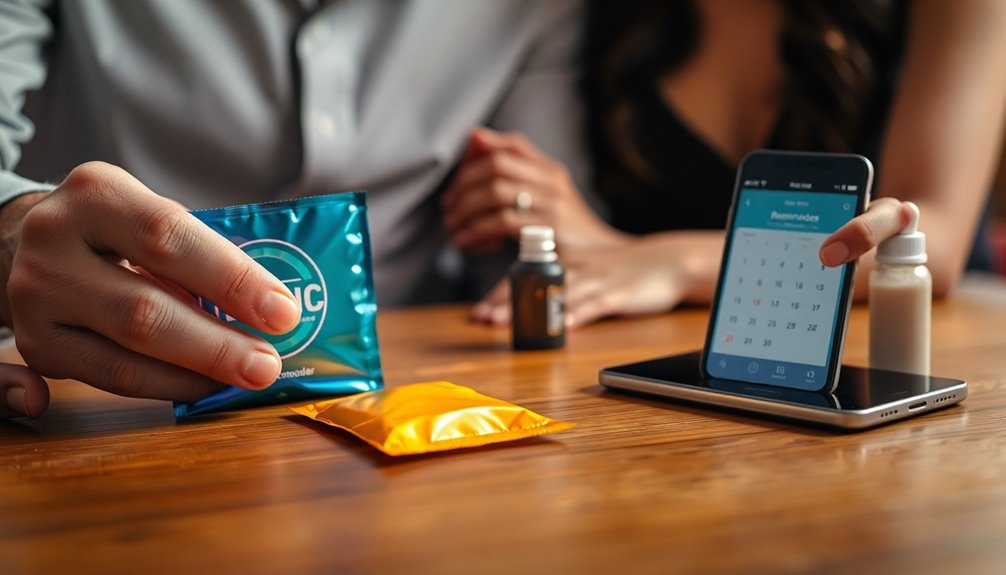To prevent pregnancy after unprotected sex, you can use emergency contraception like the morning-after pill or the Copper IUD. The morning-after pill is effective within 72 hours, with ulipristal acetate lasting up to 120 hours. The Copper IUD can be inserted by a healthcare provider within five days and is over 99% effective. These options mainly delay ovulation. Remember, timing is essential, and these methods aren't intended for regular use. Consulting a healthcare professional can help you choose the best method for your needs. There's more to discover about your options and their benefits.
Key Takeaways
- Use emergency contraception pills (ECPs) like Plan B or ulipristal acetate within 72 to 120 hours after unprotected sex to prevent pregnancy.
- Consider getting a Copper IUD inserted by a healthcare provider within 5 days post-intercourse for over 99% effectiveness.
- Understand that ECPs primarily delay ovulation and do not terminate an existing pregnancy.
- Be aware of potential side effects such as nausea and headaches after taking emergency contraception.
- Consult a healthcare provider for personalized advice and to discuss ongoing contraceptive methods for future prevention.
Understanding Emergency Contraception
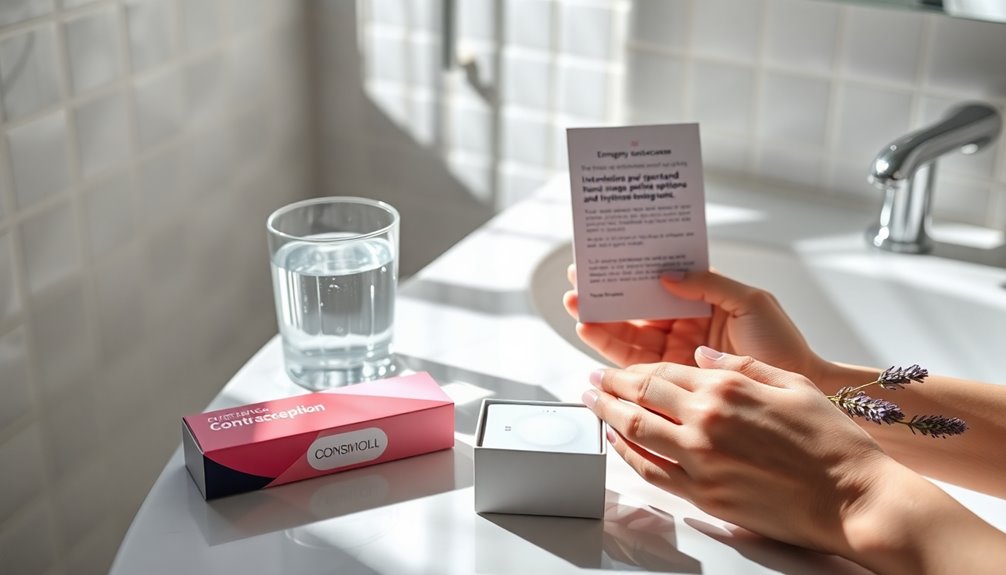
When you find yourself in a situation where unprotected sex has occurred, understanding emergency contraception (EC) can be essential. EC is designed to prevent pregnancy after unprotected sex, with options like Plan B and ulipristal acetate.
Plan B is most effective when taken within 72 hours, while ulipristal acetate works best if taken within 120 hours. Both methods primarily delay ovulation, and they don't terminate an existing pregnancy, making them suitable for women who haven't ovulated yet.
You can also consider the copper IUD, effective for up to 5 days post-intercourse. Keep in mind that the effectiveness decreases the longer you wait after unprotected sex.
Side effects may include nausea and headaches, but they usually resolve quickly.
Types of Emergency Contraception
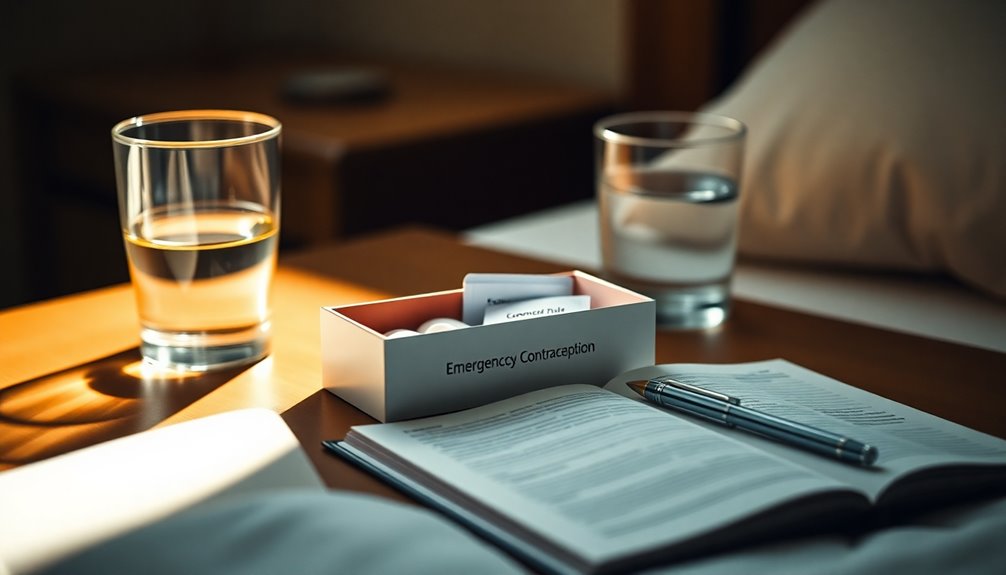
Emergency contraception (EC) offers essential options for preventing pregnancy after unprotected sex, and understanding these types can empower you to make informed choices.
The two main forms are the morning-after pill and the Copper IUD. The morning-after pill comes in two versions: levonorgestrel, which you can take within 72 hours, and ulipristal acetate (ella), effective up to 120 hours post-intercourse. Both are effective in delaying ovulation.
Alternatively, the Copper IUD can be inserted by a healthcare professional within five days after unprotected sex and boasts over 99% effectiveness.
While ECPs are available over-the-counter in some places, the Copper IUD requires a visit to a healthcare provider for insertion.
Choose the option that best fits your needs.
How Emergency Contraception Works
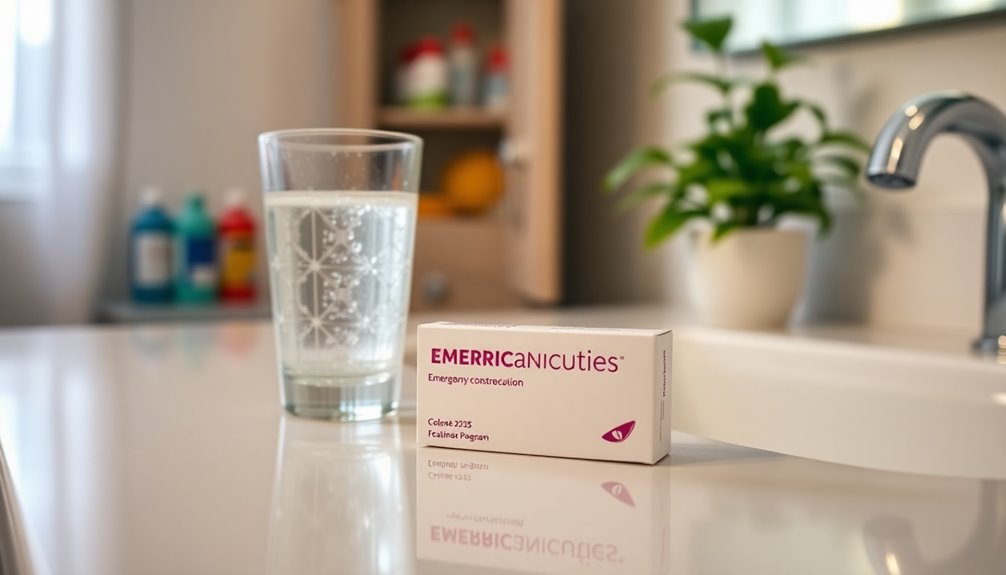
Understanding how emergency contraception (EC) works can help you make informed decisions after unprotected sex.
Emergency contraception primarily functions to delay ovulation, which reduces the chances of fertilization and ultimately helps prevent pregnancy.
There are two main types of emergency contraception: the morning-after pill, which contains levonorgestrel and is effective within 72 hours, and the Copper IUD, which can be inserted up to five days post-intercourse.
Studies show that the effective rate of these options ranges from 75-89% when used correctly.
It's crucial to recognize that emergency contraception doesn't terminate an existing pregnancy and isn't meant for regular use; it serves as a backup for contraceptive failure or instances of unprotected sex.
Timing and Effectiveness

When it comes to emergency contraception, timing is everything.
You'll find that options like emergency contraception pills (ECPs) are most effective when taken within 72 hours after unprotected sex, while the copper IUD can be inserted within five days for maximum effectiveness.
Acting quickly not only boosts your chances of preventing pregnancy but also guarantees you can return to your regular contraceptive methods right after.
Emergency Contraception Options
If you find yourself in a situation where unprotected sex has occurred, knowing your emergency contraception options can be essential. Here are four effective methods to evaluate:
- Levonorgestrel: An over-the-counter emergency contraceptive pill effective within 72 hours.
- Ulipristal Acetate: A prescription pill effective up to 120 hours after unprotected sex.
- Copper IUD: A highly effective option, over 99%, inserted by a healthcare provider within five days.
- Timing: The sooner you take emergency contraceptive pills, the more effective they are, with rates between 75-89% when used correctly.
Timing of Administration
Taking emergency contraception as soon as possible greatly boosts its effectiveness in preventing pregnancy.
The timing of administration is essential—ECPs like levonorgestrel work best when taken within 72 hours after unprotected sex, with effectiveness dropping considerably after this window.
If you opt for ulipristal acetate, you've got a bit more time, as it remains effective for up to 120 hours.
For the highest level of effectiveness, consider the Copper IUD; it can be inserted by a healthcare provider within 5 days post-intercourse and offers over 99.9% effectiveness.
Remember, the sooner you act, the better your chances to prevent pregnancy after unprotected sex.
Don't hesitate; timely action is key!
Side Effects and Considerations
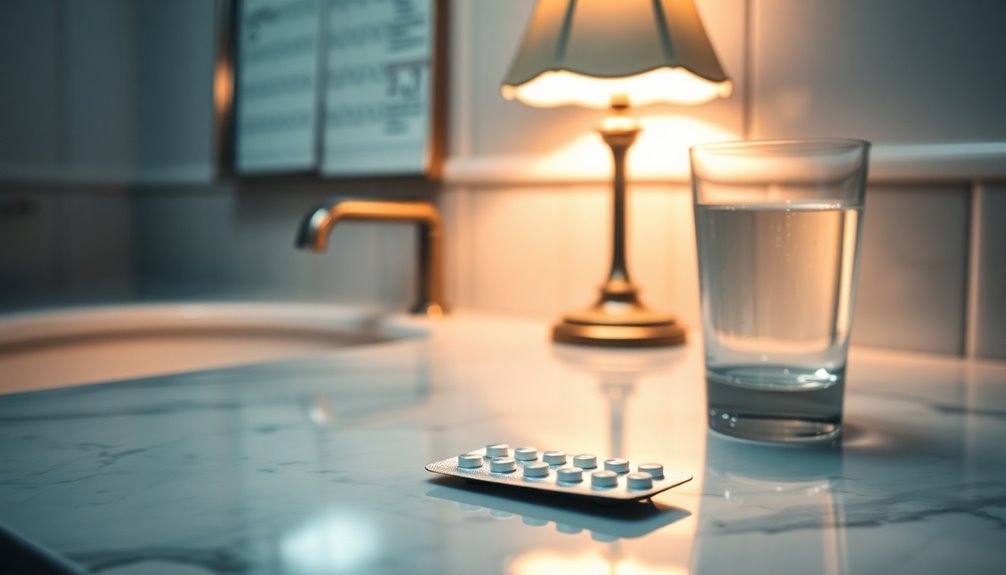
Though emergency contraception (EC) can be an effective way to prevent pregnancy after unprotected sex, it's essential to be aware of potential side effects and considerations.
Here are some important points to keep in mind:
- Common Side Effects: You might experience nausea, vomiting, breast tenderness, or headaches, which usually resolve in 1-2 days.
- Menstrual Irregularities: A delayed or heavier period can occur, so consider taking a pregnancy test if your period is over a week late.
- Effectiveness: EC's efficacy decreases over time, making it most effective within 72 hours of intercourse.
- STI Protection: Remember, emergency contraception doesn't protect against STIs—consult a healthcare professional for additional protection methods.
Accessibility and Cost
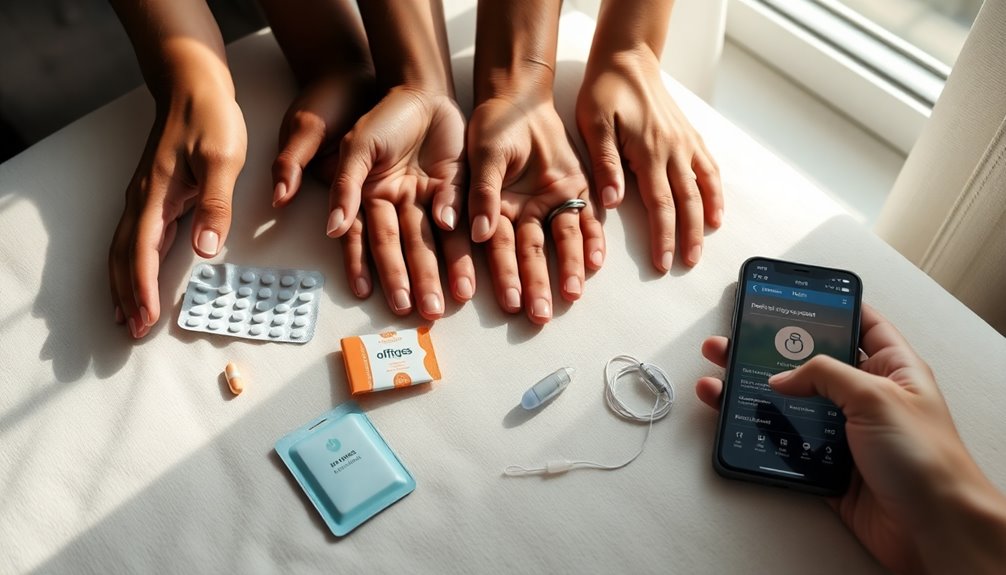
When you need emergency contraception (EC), understanding its accessibility and cost is essential. Most emergency contraceptive pills (ECPs) are available over-the-counter without a prescription, making them relatively easy to obtain.
However, options like ulipristal acetate (ella) do require a prescription. The cost of ECPs typically ranges from $15 to $70, but many health insurance plans cover these expenses, reducing your out-of-pocket costs.
Accessibility can vary by location, with some states having specific regulations that may limit availability in pharmacies. If you're looking for more affordable options, many public health clinics offer ECPs at reduced prices or even for free.
The Copper IUD is another option but requires a healthcare professional for insertion and can have higher upfront costs.
Barrier Methods Overview
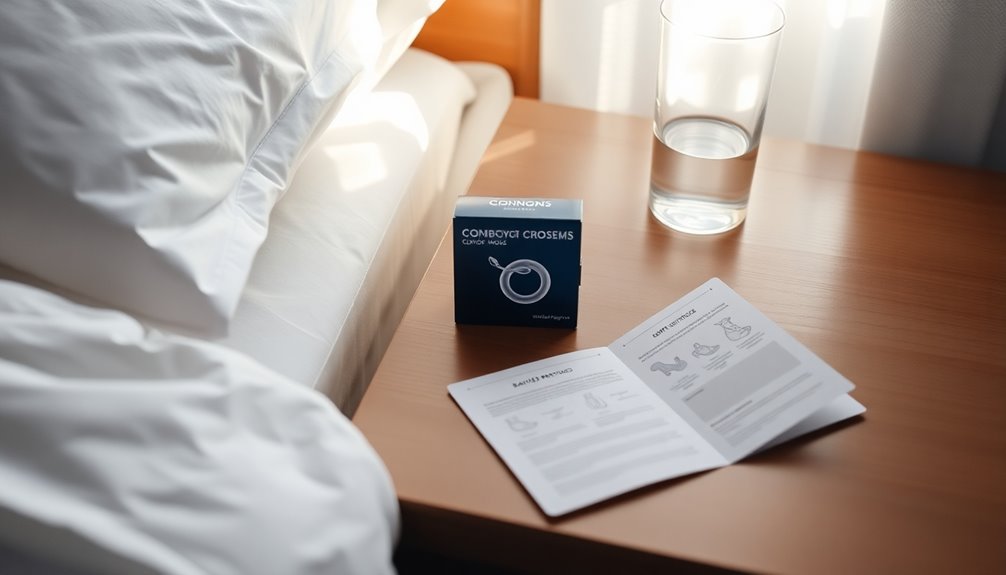
Barrier methods are effective contraceptive options that create a physical barrier to prevent sperm from reaching the egg. Their effectiveness typically ranges from 70-90%, depending on the method used.
Here's a quick overview of common barrier methods:
- Male Condoms: Over 80% effective and the only method providing protection against STIs.
- Female Condoms: Approximately 79% effective, offering an alternative for those who prefer not to use male condoms.
- Diaphragm: Most effective (90% with spermicide), but requires a prescription and proper fitting.
- Cervical Cap & Contraceptive Sponge: Both cover the cervix; the sponge contains spermicide and has an effectiveness range of 76-88%.
Choosing the right barrier method can enhance your contraceptive strategy.
Hormonal Methods of Contraception

When considering hormonal methods of contraception, you've got several options like pills, patches, and injections to explore.
These methods can be over 90% effective with proper use, but it's important to understand their side effects and usage requirements.
Let's break down the different types and what you need to know to make an informed choice.
Types of Hormonal Methods
Hormonal methods of contraception offer a reliable way to prevent pregnancy by primarily stopping ovulation. Here are some common types:
- Combined hormonal contraceptives: These contain both estrogen and progestin, effective in preventing ovulation.
- Progestin-only methods: Known as mini-pills, these are suitable for those who can't take estrogen.
- Hormonal IUDs: These are long-term solutions that release hormones, providing over 99% effectiveness for several years.
- Implants: Similar to IUDs, these also release hormones to prevent ovulation and last for years.
Using the contraceptive pill can achieve over 99% effectiveness with perfect use.
But remember, hormonal methods don't protect against STIs, so consider your overall sexual health.
Effectiveness and Usage
Understanding the effectiveness and proper usage of hormonal methods of contraception is crucial for preventing unintended pregnancies.
Hormonal birth control methods, like pills, patches, and injections, are over 90% effective when used consistently. With perfect use, combined hormonal contraceptives can be over 99% effective.
If you have unprotected sex, consider emergency contraception as a backup option to prevent pregnancy. It's essential to take your hormonal pills at the same time daily to maintain their effectiveness, as missed doses can considerably increase the risk of pregnancy.
Side Effects and Considerations
Using hormonal methods of contraception can be effective, but it's important to be aware of the potential side effects and factors that come with them. Here are a few key points to take into account:
- Side Effects: You might experience nausea, headaches, or mood changes, but these usually resolve quickly.
- Blood Clots Risk: Some methods can increase blood clot risks, especially if you smoke or have certain health issues.
- Consultation: Always seek medical advice from a healthcare provider or health clinic to determine the best method for you.
- STI Protection: Remember, hormonal contraception doesn't protect against sexually transmitted infections, so think about dual protection with condoms for added safety.
Be informed and proactive about your contraceptive choices!
Natural and Other Methods

When you're looking to prevent pregnancy after sex, several natural and other methods can help you manage your reproductive health effectively.
Natural family planning involves tracking your menstrual cycle to identify fertile days and avoiding unprotected sex during that time, achieving about 76% effectiveness when done accurately.
The withdrawal method, where your partner pulls out before ejaculation, has an approximate effectiveness of 78% but is less reliable.
While it's tempting to contemplate douching or urinating after sex, these won't prevent pregnancy and can disrupt your vaginal flora.
If you need to act quickly, emergency contraception like the morning-after pill or Copper IUD can effectively prevent sperm from reaching the egg if used within specific time frames.
Frequently Asked Questions
How Can I Prevent Pregnancy Naturally After Sex?
To prevent pregnancy naturally, you can track your menstrual cycle to identify fertile days and avoid intercourse during that window.
Consider using the withdrawal method, but remember it requires strong self-control and isn't foolproof.
Maintaining a healthy lifestyle with proper nutrition and stress management can help regulate your cycle, making natural methods more effective.
Just keep in mind that some common myths, like urinating or douching, aren't reliable methods to prevent pregnancy.
Can You Still Prevent Pregnancy After Sex?
Yes, you can still prevent pregnancy after sex. While it might seem too late, options are available.
You've got emergency contraception like the morning-after pill, which works best when taken promptly. Alternatively, a healthcare provider can insert a copper IUD within five days, offering high effectiveness.
The sooner you act, the better your chances are. Remember, though, if your period's late, it's wise to take a pregnancy test or seek advice.
How Can I Clean up After Sex to Avoid Pregnancy?
After sex, you might want to clean up for comfort and hygiene.
You can start by gently wiping the area with a clean cloth to remove any bodily fluids.
Urinating can help reduce the risk of urinary tract infections, but remember it won't affect pregnancy risk.
For effective pregnancy prevention, consider using barrier methods like condoms during intercourse.
If you're concerned about unprotected sex, explore emergency contraception options as soon as possible.
How Do You Get Rid of Sperm After Unprotected Sex?
Imagine you just had an intense moment with someone special, but now you're worried about sperm lingering.
You might think about urinating to flush things out, but that won't work. Sperm can swim to the uterus in minutes.
Instead, consider emergency contraception like Plan B, which you can take within a specific timeframe.
Always consult a healthcare professional for the best options; they can guide you through your choices effectively.
Conclusion
In the journey of preventing pregnancy after sex, knowing your options is key. Whether you choose emergency contraception or explore barrier and hormonal methods, being informed empowers your decisions. Remember, timing's essential, so don't hesitate to act when needed. Like a safety net in a circus, these methods catch you before you fall. Stay proactive, communicate with your partner, and prioritize your reproductive health. With the right knowledge, you can steer your path confidently.

